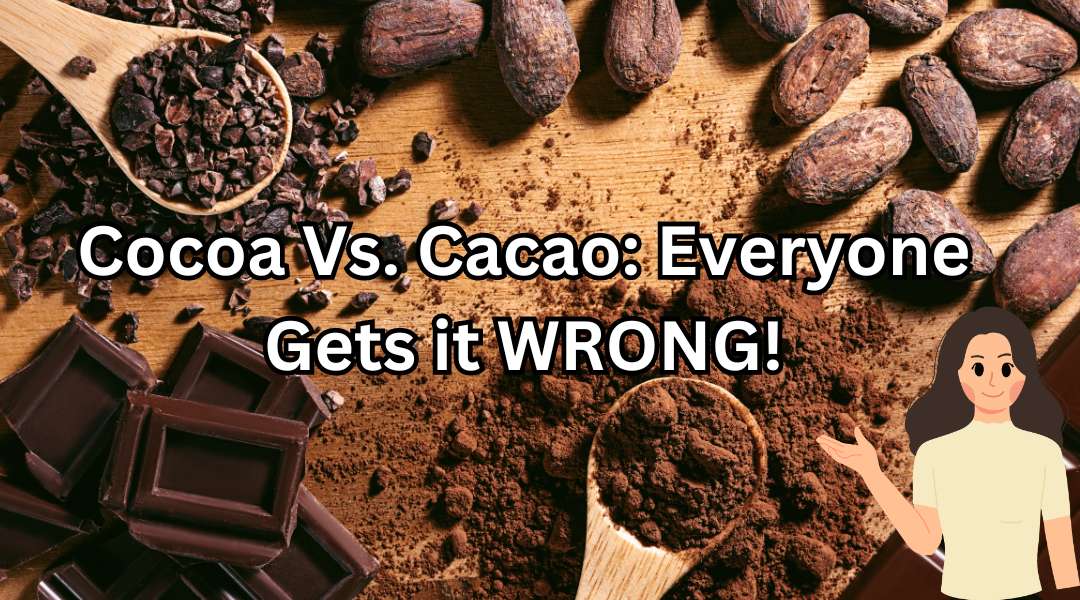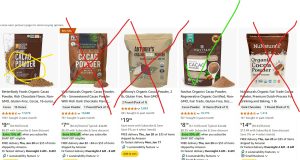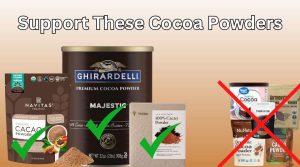Yup, I said it. Everyone gets this wrong ranging from dietitians, culinary experts, industry insiders, and consumers. I have seen a couple instances of articles getting it correctly, but it’s quite rare. There is no uniformity on what consists of cocoa and cacao, and you’ll hear so many different answers that you’ll walk away worse off than when you started. I’ll start off by saying you can check out my TikTok that explains how and why everyone gets cocoa vs cacao wrong if you’d like to watch it instead of reading it.
Why does everyone get it wrong, then? And why would you trust me over a dietitian? The answer is you can fact check everything I say here if you wish to research more. If you didn’t watch the TikTok (I’d be happy if you watched and followed but it’s not necessary), then I’ll explain the differences here and you can verify it at your leisure.
Clearing Many Misconceptions
Number 1: Cocoa and Cacao are THE SAME Products
The biggest misconception I see everyone make is that cocoa and cacao are different products. Absolutely not true, but if you search Google, TikTok, YouTube, you’ll find almost 100% of every content creator will try to tell you the many “differences” of cocoa and cacao. Just know, most are parroting incorrect information.
Cocoa has two interpretations: 1.) cacao in powdered form; 2.) it’s the English translation of cacao.
Many content creators and health experts that don’t actually understand the chocolate making process will tell you that cacao powder is a healthier version of cocoa powder, which is simply not true. Cocoa powder and cacao powder are entirely identical. In your search, you’ll find many influencers claim cocoa is roasted at a higher level than cacao. This makes absolutely no sense. If we think about this incorrectly repeated claim, it rapidly falls apart. A cacao bean is roasted to reduce water content and develop flavor. But many people think that if the cacao bean reaches a certain temperature, it suddenly becomes a cocoa bean. In no way does this make sense. A cocoa bean and a cacao bean are identical and differ in name only. Anyone claiming otherwise should be met with a healthy dose of skepticism. You can call it cocoa powder and you can call it cacao powder. They are 100% interchangeable. It’s entirely preference. Don’t be told to think or say otherwise.
Number 2: Cacao Powder Is NOT Exclusively Non-Alkalized
I’ve seen this misconception floating around a LOT. Knowing that cocoa and cacao are identical, then it continues to make no sense that cacao powder isn’t alkalized while cocoa powder is. If you take cacao powder and alkalize it, which is a very common trend, it doesn’t suddenly become cocoa powder, it’s just alkalized cacao (cocoa) powder. While there’s no excusing this commonly repeated misconception, there is a reason as to why many consumers confuse the two. The simple answer is marketing. Companies that tend to use the term “cacao” want to sound more natural and truer to the roots of their chocolate. These companies tend to keep their products more natural and thus may opt to not alkalize their cacao powder. Content creators start associating the alkalization process with low quality “cocoa powder” and only high quality “cacao powders” aren’t alkalized. Another wholly false claim that gets spread all over the internet.
There are a million things that can be said about the alkalization process of cacao, but as far as the claim goes cacao powder isn’t alkalized and cocoa powder is alkalized holds no merit. Do not purchase your cacao powder thinking otherwise, else you may end up buying an alkalized cacao powder and being confused. Always read the label as the ingredients need to legally disclose if the cacao was processed with an alkali.
Number 3: Cacao Powder is NOT Healthier than Cocoa Powder
You’re going to notice a trend here that since cocoa powder and cacao powder are identical and interchangeable, the core of every misconception falls back onto people misunderstanding that they are the same product. Like clockwork, let’s get into it.
Cacao powder is not healthier than cocoa powder. This belief comes from influencers claiming that cacao powder is roasted at lower temperatures while cocoa powder is roasted at much higher temperatures, thus destroying any nutrients (flavonoids and polyphenols). It is true that roasting cacao beans destroys many of the nutrients (https://www.ncbi.nlm.nih.gov/pmc/articles/PMC5852288/).
However, instead of looking for just cacao powders under the (incorrect) assumption that the cacao has been roasted at a lower temperature, it’s more effective to find a cocoa powder that advertises they roast their cacao at lower temperatures. Cocoa or cacao, it doesn’t matter. Read the bag or visit the website to see if the company discloses how they source and roast their cacao. Only then will you know its roast profile (you can also see my list here about good quality cacao powders)
Number 4: Only Cacao Powder is Ethically Sourced
This misconception also falls victim to the trend of companies that tend to use “cacao” instead of “cocoa” usually put more emphasis on sourcing. However, cacao is a heavily exploited industry with many human right violations. Making the claim that cacao powder is ethically sourced while cocoa powder is not is a very outlandish one. A driving factor of this misconception is big names like Hershey, Walmart, and other box stores are famous for selling the lowest quality products with the lowest cost of sourcing. All very bad things. However, Hershey’s has started putting “100% Cacao” on their containers because they know many people believe these misconceptions and by simply putting “100% cacao” on their box is enough to make consumers feel comfortable enough to buy it. Hence, the cocoa vs cacao debate is all marketing and big companies are taking full advantage of the situation.
Number 5: Cacao Powder is NOT Raw
Cacao powder is never raw, but this claim is made at alarming rates. You can head over to Google and type in “raw cacao powder” and find many results claiming such. Another dangerous misconception is that cacao powder is “raw”. To be clear, truly raw cacao is not edible to humans and even if it were, it’s so earthy and bitter that it goes beyond something we’d reasonably call food. When these companies are dangerously claiming their cacao is “raw”, what they really mean is it went through the entire typical cacao process, but it was possibly “lightly roasted” or was carefully fermented to temperatures near 120°F (50°C). I put that in quotes because most companies will not share their roasting temperatures or what they even consider raw. In this context, “raw” means it was roasted to about 118°F (48°C). The dangerous aspect here, though, is a majority of consumers do not know what any of this means and these companies love taking advantage of that. “Lightly roasted” and “raw” usually mean the same thing since companies are not going to sell you raw, uncultivated cacao beans without explicitly advertising it as such. Just be aware of these marketing jargon terms that are usually never disclosed.
Conclusion
You’ve now seen the many misconceptions you’ll find when searching for cocoa vs cacao differences and perhaps many other questions you have regarding cacao in general. The chocolate industry is one of the most exploited and heavily marketed that there’s really no comparisons when it comes to how confusing it is. I’ve endlessly searched and have been severely disappointed with the results and I’m appalled at how misinformed everyone is. That’s why I’m writing this for you, to offer some fact-based insight that you can always verify on your own (tho I do try to link my sources when I can) which I hope builds trust in me and allows me to continue providing you with high quality content and authentic products. Thank you for reading and I hope you can now navigate the whole “cocoa vs cacao” debate much easier.




